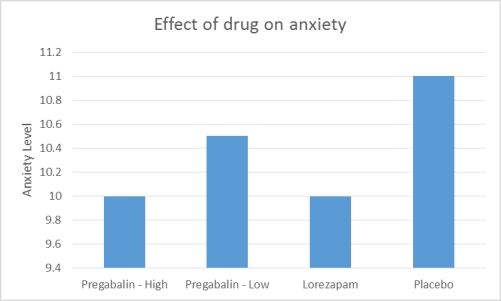Use the following to answer questions
Scenario I
Scenario I is based on fabricated data inspired by the following study:
Pande, A. C., Crockatt, J. C., Feltner, D. E., et al. (2003) . Pregabalin in generalized anxiety disorder: a placebo-controlled trial. The American Journal of Psychiatry, 160(3) , 533-540.
Effect of Pregabalin on Anxiety
Pande and colleagues examined whether pregabalin (brand name Lyrica) was as effective as lorazepam (brand name Ativan) in treating anxiety. To that end, they administered either a low dose of pregabalin, a high dose of pregabalin, lorazepam, or placebo to participants for four weeks, then measured the participants' anxiety using the Hamilton Anxiety Rating Scale. The researchers found that not only did the high dose of pregabalin significantly reduce anxiety, but that it also reduced anxiety as well as lorazepam. The results of the study (Figure 1) indicate that pregabalin may be an effective alternative to lorazepam to treat anxiety in adults.
 Figure 1. Hypothetical results of Pande et al (2003) showing the impact of each treatment on anxiety level. Anxiety was measured using the Hamilton Anxiety Rating Scale.
Figure 1. Hypothetical results of Pande et al (2003) showing the impact of each treatment on anxiety level. Anxiety was measured using the Hamilton Anxiety Rating Scale.
-(Scenario I) What ethical principle would be in question if the criteria for participating in the study included having health insurance?
Definitions:
Q2: Data are to science as:<br>A) anecdotes are
Q3: Consider the reaction C<sub>2</sub>H<sub>5</sub>OH(l) + 3O<sub>2</sub>(g) <font
Q9: A(n)_ is a statement based on repeated
Q9: Each of the following is a benefit
Q11: Deborah would like to get consumers' feedback
Q47: A longitudinal study uses a(n)_ design.<br>A) experimental<br>B)
Q65: Which of the following would be a
Q69: Which of the following is NOT an
Q79: If concealment efforts are deemed justifiable and
Q98: A cover story is used to:<br>A) tell